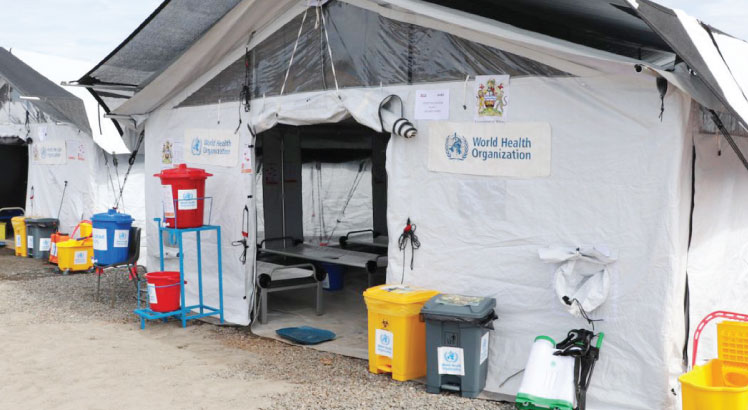Magdalena Nyirenda, 42,recalls bitter memories of a period when people in Galang’anda area near Mwazisi Trading centre in Rumphi relied on a winch-operated shallow well opened in 1997 and a three-year-old hand-pump.
The shallow well, Nyirenda recalls, exposed the community to cholera, other waterborne diseases and malaria, as it served as a breeding ground for mosquitoes.
Flashback: One of the cholera treatment camps in Blantyre
Besides, the mother of five explains that the poorly covered well also posed a risk of drowning children.
Rumphi faces challenges in supplying potable water to communities, says district water officer Vincent Horowanya.
“These challenges emanate from its hilly topography and a lack of sustainable technologies capable of supplying water throughout the year,” he says.
But, with the establishment of a solar-powered water supply system at Mwazisi Health Centre, the wells in Mwazisi have become monuments to a bygone era.
Patients, guardians and health workers at the public health facility and its surrounding communities benefit from a water, sanitation, and hygiene (Wash) project implemented by Unicef with funding from the Bureau of Humanitarian Assistance (BHA) through USAid.
Similar initiatives are also taking shape in Blantyre, Chikwawa, Machinga, Mangochi, Nkhata Bay, Nkhotakota, Rumphi, Salima and Zomba to improve access to improved climate-resilient water supply services in communities and healthcare facilities.
At Mwazisi Heath Centre, Unicef has installed a solar-powered deep well and two 20 000-litre water tanks. In addition, the project has constructed handwashing facilities at the health centre and provided six communal water points.
These water points consist of two at the health centre, one each at Mwazisi Primary School, the market, the church, and the community.
“The implementation of the water system has greatly facilitated the work of the health centre staff and has significantly eliminated conflicts with the surrounding communities, explains Verson Chenje,” a senior health surveillance Assistant at the health facility.
For 16 years, the community health worker has witnessed first-hand the transformation of the area into a rural growth centre.
Recalls Chenje: “When I first joined, the health centre did not have a reliable water supply. This forced patients, their guardians and pregnant women to fetch water from boreholes located at a considerable distance from the facility.
“We were later connected to the national electricity grid. A water tank was installed, which utilised electric power to pump water from a borehole for use at the health centre. However, this development brought its own set of problems.
“During blackouts, people had to fetch water from unprotected wells far away from here. Additionally, community members were also using the same water tap as the health centre, leading to congestion and frequent damages to the tap.”
The solar-powered water system was intended to address the issue of blackouts, electricity bills, communal conflicts and quality of care at the health centres.
As Chenje affirms, those problems are now a thing of the past.
“The tap at the health centre no longer gets damaged frequently. Guardians, patients, and pregnant women can easily access water within the facility. Furthermore, the community is no longer a source of inconvenience, as there are now four water points scattered throughout the area.”
The post Water project fights cholera and scabies appeared first on The Nation Online.
 Moni Malawi
Moni Malawi 

